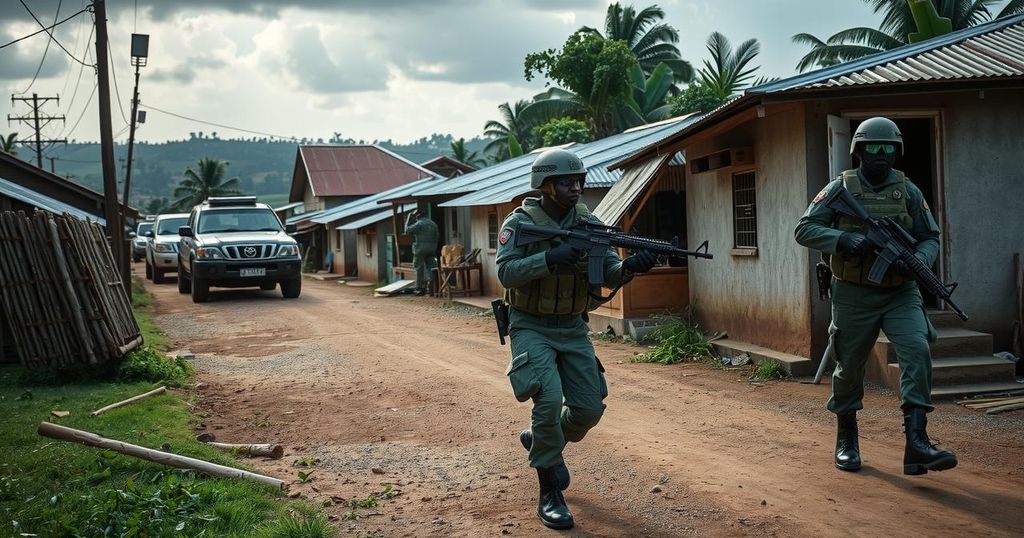Rwanda-backed rebels, the M23 group, have seized the town of Masisi in eastern DRC, marking their second victory in two days within the mineral-rich North Kivu province. Local leaders express deep concern over the humanitarian implications, while mediation efforts between DRC and Rwanda have stalled. The conflict has historical roots, with accusations of exploitation of local resources, exacerbating the dire situation for displaced populations.
Rebel forces affiliated with Rwanda have successfully captured the town of Masisi in eastern Democratic Republic of the Congo (DRC), following the recent acquisition of the nearby town of Katale. The M23 group, which has been operating in North Kivu province since 2021, has gained control over significant portions of the region, leading to a surge in the number of displaced persons seeking refuge. This recent seizure further exacerbates an already precarious humanitarian situation in the area, prompting local officials to call for increased military support from the Congolese government.
Alexis Bahunga, a member of the North Kivu provincial assembly, expressed his dismay, stating, “It is with dismay that we learn of the capture of Masisi centre by the M23,” highlighting the desperate need for improved military responses to such incursions. The situation poses severe risks for residents; during a meeting, M23 representatives told local inhabitants they had come to “liberate the country.” Of note, Masisi is the administrative capital of the region, housing approximately 40,000 residents, and is situated approximately 80 kilometers from the provincial capital of Goma, which the M23 had previously occupied.
Attempts by Angola to facilitate dialogue between Congolese President Félix Tshisekedi and Rwandan President Paul Kagame have unfortunately faltered. UN reports indicate Rwanda’s military involvement, with approximately 4,000 soldiers reportedly engaged alongside the M23 forces in DRC. The conflict between these groups has historical roots, originating in the M23’s establishment in 2012, initially intended to protect the Tutsi population from persecution, yet critics argue that Rwanda has exploited the M23 for its mineral wealth, including lucrative resources such as gold and cobalt.
Additionally, amidst these developments, the DRC government has taken legal action against tech giant Apple regarding the extraction and use of so-called “blood minerals,” emphasizing the ongoing complexities surrounding resource exploitation in the region. With tensions escalating and humanitarian crises deepening, the emphasis on diplomatic resolutions remains urgent, yet the realities on the ground appear increasingly dire.
The situation in the Democratic Republic of Congo (DRC) has been characterized by sustained conflict and instability, particularly in the eastern provinces rich in mineral resources. The M23 rebel group has emerged as a significant player since its formation as an offshoot of other factions in 2012, claiming to advocate for the Tutsi population. However, the group’s operations have often been viewed through a lens of resource exploitation, leading to accusations that its actions are primarily motivated by the desire to plunder valuable minerals such as gold and cobalt. Amidst this backdrop, international mediation efforts, including those by Angola, have struggled to gain traction, leaving local populations vulnerable to violence and displacement. The complex history of the region, intertwined with issues stemming from the Rwandan genocide, further complicates diplomatic relationships and security efforts.
The recent seizure of Masisi by Rwanda-backed M23 rebels underscores the deteriorating security situation in eastern DRC, raising alarms over humanitarian crises and regional stability. Despite international efforts to mediate the conflict, the persistent armed incursions present formidable challenges to local governance and civilian safety. As accusations of resource exploitation grow alongside armed conflict, there remains an urgent need for a cohesive and robust response from both the Congolese government and the international community to address the underlying issues in the volatile region.
Original Source: www.bbc.co.uk






